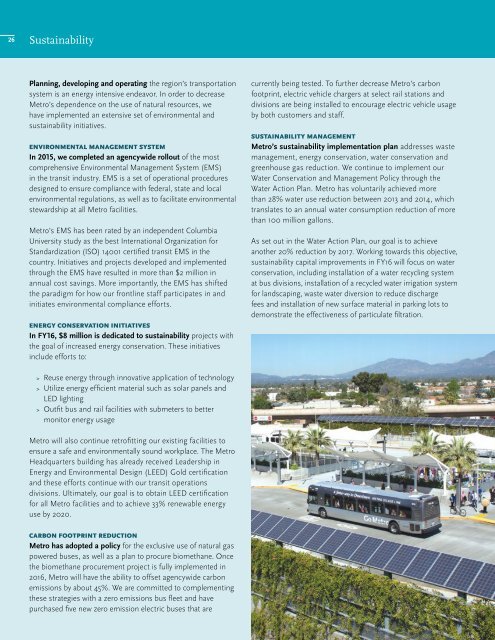Adopted Budget
XEhJr
XEhJr
You also want an ePaper? Increase the reach of your titles
YUMPU automatically turns print PDFs into web optimized ePapers that Google loves.
26<br />
Sustainability<br />
Planning, developing and operating the region’s transportation<br />
system is an energy intensive endeavor. In order to decrease<br />
Metro’s dependence on the use of natural resources, we<br />
have implemented an extensive set of environmental and<br />
sustainability initiatives.<br />
environMental ManageMent systeM<br />
in 2015, we completed an agencywide rollout of the most<br />
comprehensive Environmental Management System (EMS)<br />
in the transit industry. EMS is a set of operational procedures<br />
designed to ensure compliance with federal, state and local<br />
environmental regulations, as well as to facilitate environmental<br />
stewardship at all Metro facilities.<br />
Metro’s EMS has been rated by an independent Columbia<br />
University study as the best International Organization for<br />
Standardization (ISO) 14001 certified transit EMS in the<br />
country. Initiatives and projects developed and implemented<br />
through the EMS have resulted in more than $2 million in<br />
annual cost savings. More importantly, the EMS has shifted<br />
the paradigm for how our frontline staff participates in and<br />
initiates environmental compliance efforts.<br />
energy conservation initiatives<br />
in Fy16, $8 million is dedicated to sustainability projects with<br />
the goal of increased energy conservation. These initiatives<br />
include efforts to:<br />
currently being tested. To further decrease Metro’s carbon<br />
footprint, electric vehicle chargers at select rail stations and<br />
divisions are being installed to encourage electric vehicle usage<br />
by both customers and staff.<br />
sustainaBility ManageMent<br />
Metro’s sustainability implementation plan addresses waste<br />
management, energy conservation, water conservation and<br />
greenhouse gas reduction. We continue to implement our<br />
Water Conservation and Management Policy through the<br />
Water Action Plan. Metro has voluntarily achieved more<br />
than 28% water use reduction between 2013 and 2014, which<br />
translates to an annual water consumption reduction of more<br />
than 100 million gallons.<br />
As set out in the Water Action Plan, our goal is to achieve<br />
another 20% reduction by 2017. Working towards this objective,<br />
sustainability capital improvements in FY16 will focus on water<br />
conservation, including installation of a water recycling system<br />
at bus divisions, installation of a recycled water irrigation system<br />
for landscaping, waste water diversion to reduce discharge<br />
fees and installation of new surface material in parking lots to<br />
demonstrate the effectiveness of particulate filtration.<br />
> Reuse energy through innovative application of technology<br />
> Utilize energy efficient material such as solar panels and<br />
LED lighting<br />
> Outfit bus and rail facilities with submeters to better<br />
monitor energy usage<br />
Metro will also continue retrofitting our existing facilities to<br />
ensure a safe and environmentally sound workplace. The Metro<br />
Headquarters building has already received Leadership in<br />
Energy and Environmental Design (LEED) Gold certification<br />
and these efforts continue with our transit operations<br />
divisions. Ultimately, our goal is to obtain LEED certification<br />
for all Metro facilities and to achieve 33% renewable energy<br />
use by 2020.<br />
carBon Footprint reduction<br />
Metro has adopted a policy for the exclusive use of natural gas<br />
powered buses, as well as a plan to procure biomethane. Once<br />
the biomethane procurement project is fully implemented in<br />
2016, Metro will have the ability to offset agencywide carbon<br />
emissions by about 45%. We are committed to complementing<br />
these strategies with a zero emissions bus fleet and have<br />
purchased five new zero emission electric buses that are


